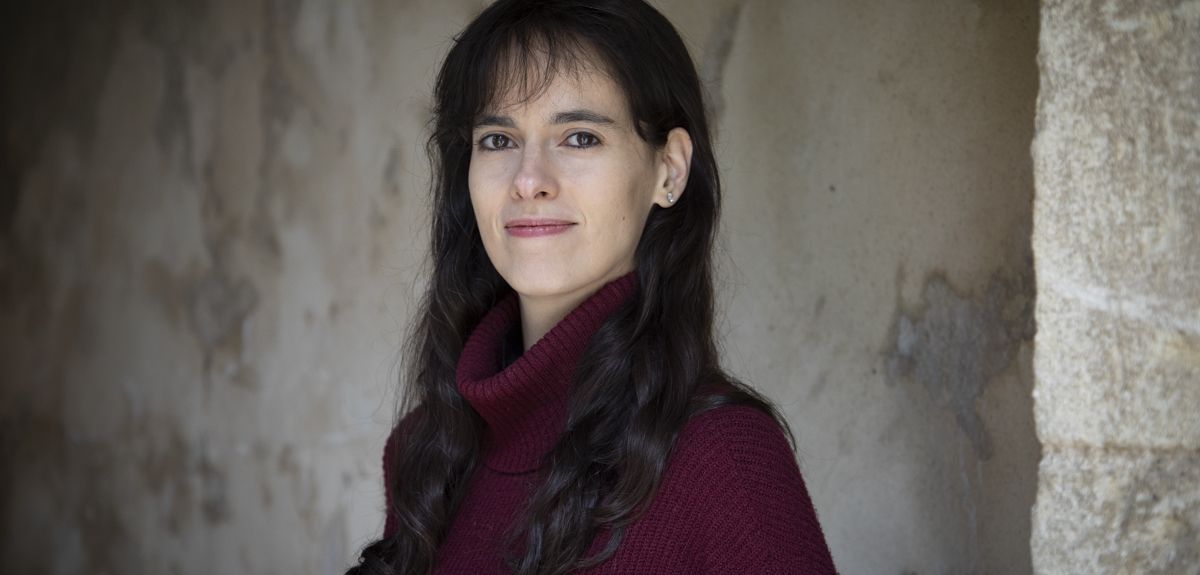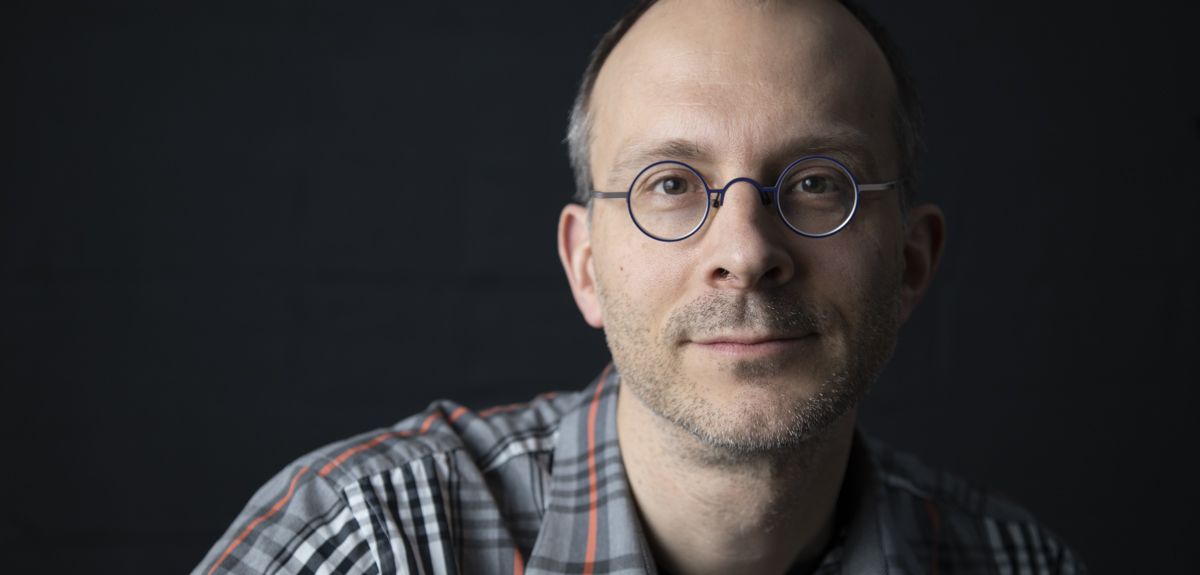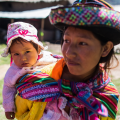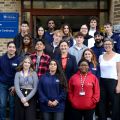Features
Online data is far more of a problem than irritating personalised ads for embarrassing products and dodgy loans. The sheer scale of personal data circulating on the internet cannot be underestimated, and it is undermining equality and democracy, according to a new book from Oxford’s Dr Carissa Véliz. She argues that we are now subjects of a powerful data world, which goes to the heart of economies and democratic government, and over which we have too little control. Privacy Is Power calls for the end to the data economy. Personal data, she argues, is not the kind of thing that should be allowed to be bought and sold.
We are now subjects of a powerful data world, which goes to the heart of economies and democratic government, and over which we have too little control
Every time you engage with tech, or tech engages with you, the data economy intrudes into your life, according to Dr Véliz, who warns about the vast amount of data now collected on everyone. It is not just your likes and dislikes, and your purchases, it is who your friends and family are, what time you get up in the morning, where you spent last night, how much money you have in the bank, whether you are unwell, how much you drink, how much you weigh, what you search for online. A virtual avatar of you can be created from every key stroke you make on your computer or your mobile phone, accumulating information about you. That data is then used to try to influence your behaviour - from what you buy to how you vote.
‘It is a perverse business model,’ says Dr Véliz. ‘We didn’t have a choice. If we wanted to have an email address or look at some content, we had to agree to give our data...no one explained the trade-off to us. By the time we realised what was going on, the system was already in place; we were told of the bargain we made after the deal was sealed.’
By the time we realised what was going on, the system was already in place; we were told of the bargain we made after the deal was sealed
Personal data is a toxic asset, argues Dr Véliz. It is poisoning individual lives, by exposing us to harms such as identity theft, discrimination, public humiliation, and more. And it is poisoning society, by jeopardising equality and democracy. Citizens are not treated as equals, but on the basis of our data. We are shown different opportunities, charged different prices, and shown different pictures of the world, all on the basis of what our data says about us.
More action is needed to regulate data companies. Privacy is Power suggests several regulatory measures:
- Ban trades in personal data;
- Ban personalised content – it contains risks for democracy by fracturing the public sphere into individual spheres;
- Implement fiduciary duties - to make sure our data can only be used in our own benefit and never against us.
But regulation will only be implemented when there is popular demand. If data were regulated appropriately, individuals would not have to spend much effort protecting their privacy. But, until we get there, it is important to protect your privacy.
First, because it can save you from bad experiences, such as unfair discrimination. If you have been denied a loan, a job, or even an apartment, it might be because of what is in your data file. Second, because protecting your privacy will also protect others. Your data contains information about other people. Third, because by protecting your privacy, you make a statement that you care about your own privacy. It creates public pressure for governments and companies to respect privacy and it creates a paper trail, so that regulators can punish institutions which do not comply with our data rights (e.g. if you ask them to delete your data and they don’t).
If you had been denied a loan, a job, or even an apartment, it might be on account of your data file
In her book, Dr Véliz maintains there are basic steps we can all take to resist the data economy. ‘Always change the defaults,’ she says. ‘And make sure you use the strictest privacy settings, so only your friends can access your information.
‘Choose privacy-friendly alternatives. Instead of Google Search, try DuckDuckGo, for example. Try to say ‘no’ to cookies. Ask companies to send you the data they have on you and then confirm they have deleted it.’
She maintains, ‘Some 92% of people have had a bad experience online related to privacy...The individual risks are considerable.’
Dr Véliz says, ‘To collect as much personal data as possible and keep it for as long as possible is reckless. It’s even a danger from the point of view of national security. It is a ticking bomb.’
‘Before the Second World war, the Netherlands kept careful records of its population’s religious affiliation. It meant that the Nazis, by looking through the registries, were able to locate and murder some 73% of the Jewish population. But, in France, by contrast, where they did not keep such records for privacy reasons, it was not as easy to know who was Jewish, although the Nazis were able to find and assassinate some 25% of the Jewish population in France,’ says Dr Véliz.
Imagine if there were a new authoritarian regime, similar to the Nazis, and they had real-time data of your location, your face, your political beliefs, religious background, and so much more
‘Imagine if there were a new authoritarian regime, similar to the Nazis, and they had real-time data of your location, your face, your political beliefs, religious background, and so much more. During the Second World War, there was a largely unsuccessful attempt to set fire to the Amsterdam registry. The Dutch made two mistakes: they collected too much personal data and they didn’t have an easy way to delete that data in an emergency. We are making both of those mistakes on an unprecedented scale.’
Carissa Véliz is an Associate Professor at the Faculty of Philosophy and the Institute for Ethics in AI, and a Tutorial Fellow at Hertford College, University of Oxford.
See Dr Véliz in conversation with Professor Rasmus Nielsen, Lead Researcher on the Oxford Martin Programme on Misinformation, Science and Media discussing Privacy is Power: https://www.youtube.com/watch?v=lVLMnRE0HY4&feature=youtu.be
See the book launch at the Institute for Ethics in AI: https://www.youtube.com/watch?v=giQmtJ7LjMY
In 2018, 2019 and 2020, the World Happiness Report ranked Finland the world's happiest country, both for its total population and for the immigrants there. The United States and the UK were placed eighteenth (fifteenth for immigrants) and nineteenth (twentieth for immigrants), respectively.
The Nordic model has long been touted as the aspiration for social and public policy in Europe and North America, but what is it about Finland which makes the country so successful and, seemingly, such a great place to live?
In the quest for the best of all societies, the School of Geography and the Environment’s Professor Danny Dorling, and co-author Annika Koljonen, explore what can be learnt from Europe’s most equitable country, why it has been so successful, with what consequence, and what does not work well when equality is so high in a newly published book, ‘Finntopia’.
Professor Danny Dorling explains more:
How did 'Finntopia' come about and what main themes does it explores?
I gave a talk in the city of Cambridge for a local group, which had formed a few years ago to campaign for greater equality locally. Like Oxford, Cambridge is very socially divided, by some measures it can lay claim to being the most economically divided in the country. Oxford comes a close second place – for instance, just look at how much the exam results awarded to children living in the city of Oxford vary by where they were born and how rich or poor their parents are. These exam results are almost all about postcodes and privilege but, in very unequal societies, many people can have little idea about that. At Cambridge, I explained this situation would be funny, were it not so sad.
Annika Koljonen was volunteering with the campaigning group. She was then a student in England, but she had been brought up mostly in Finland. What I was saying was extremely clear to her, because she had seen what happens in a more equitable country, Finland - how much less deluded people are there, and what a more equitable education system can achieve, both in reducing delusion and increasing genuine ability. ‘Finntopia’ looks at many aspects of life in Finland, but there is a great deal as well on childhood, education and on later social outcomes.
So, what is Finland’s secret to happiness?
The population of Finland, more than any other on Earth...realises that what it has...is very good
In a nutshell, the population of Finland, more than any other on Earth at the moment, realises that what it has, what it is living with – each individually and collectively – is very good. By very good, I do not mean perfect, but – all things considered – very good.
Finns then, in aggregate, translate this perception to the highest proportion of positive answers recorded per person in world happiness surveys, and have done for each of the last three years. The phrase ‘all things considered’ is important here. The expectations of Finnish people are realistic. They are also aware of what they have achieved in so many spheres of life. It is not just educational achievement but, more importantly, in health, where, a few years ago, Finland recorded the lowest infant mortality the world has ever known. There are fewer grieving parents in Finland than anywhere else, per capita. Finland scores in the top three, usually being the top one, in more than 100 similar social statistics. But the Finns are not smug or complacent. An average Finn would be a little annoyed to read what I have just written and for me to have not mentioned some downsides of life in Finland, or risks in the future to the Finnish achievement.
Can Finland be caught up or overtaken?
It is inevitable that Finland will not keep the top spot for ever. In fact, holding that position for three years is remarkable and may well have a little to do with luck and sample variance in the survey and measures used.
There are several other countries where people are almost as happy as they are in Finland, at any point one of those countries might, very likely, take the top spot. It will be interesting to watch, and the pandemic may play a role in next year’s ranking. Neighbouring Sweden, currently ranks seventh on happiness, but its people might express a little more happiness than Finland’s because their movements and activity were not quite as restricted during lockdown. Alternatively, the country that ranked eighth in 2020, New Zealand, might suddenly jump to pole position , if its citizens decide they really have enjoyed global isolation and a much stricter set of government policies on travel during the pandemic. We will just have to wait and see.
In the long-term, success for Finland would be to see its measures adopted elsewhere and other countries record similar or even higher rankings. That can also happen if the Finns decide that what they have, given the head start they now have gained, is just not good enough in future if they don’t keep improving.
How do you think the country’s ethos might have helped its approach or response to a global pandemic?
Being cautious certainly helped...personal protective equipment has been stockpiled in Finland since at least the 1957 influenza pandemic
Being cautious certainly helped. This helped directly in that personal protective equipment has been stockpiled in Finland since at least the 1957 influenza pandemic.
Finland was ready in ways countries, such as the four which make up the UK, were not. The health service in Finland was also in a far more robust state than the health service in the UK (public spending in Finland has been so much higher for many years). However, the UK has a national health service, which was still mostly public, the US does not.
Finland has much more that would have helped, had the pandemic become well-established in Finland (which it did not): a better social security and employment system is a good example. Finland would not have worried about people who were homeless catching and spreading the disease because almost no one is homeless in Finland.
Finally, politicians in Finland resign at the slightest whiff of corruption or incompetence; and the population of Finland elect competent politicians . Doing the opposite leads to bad pandemic outcomes.
If this book could help bring about one change what would you want it to be and why?
I would hope that the book can give people more hope, especially younger adults and school children. Many think that people are doomed, as the climate emergency is not addressed and as biodiversity continues to be decimated. I visit schools and children tell me that the billionaires have taken almost everything everywhere and there is no hope. I meet university students and young people in employment who think they will spend the rest of their lives struggling to pay rent to landlords, who will have more holidays and grow even richer at their expense.
I meet many people who think that everything is getting worse everywhere and who do not realise that all the states in the EU28 were more equitable than the UK, or that states such as Finland are already committed to being carbon neutral - decades before the UK. I would like people to know what is possible and also to realise how long it took and how much effort it took. What Finland has achieved did not occur overnight; but most of the world has more in common with Finland than with former world dominant states such as the USA and UK.
What Finland has achieved did not occur overnight; but most of the world has more in common with Finland than with...former world dominant states such as the US and UK
What brought you to academia and what drives your research interests
I never left university. I was very lucky in my choice of where I went; and I was incredibly lucky be born into a family where it was seen as ok to go to university. I was born at a time when only one child in 50 from an average school (not a grammar school) went to university. I had almost no idea what I wanted to do at age 18, but I knew I wanted to go to university, that I wanted to travel a long way from where I had grown-up, to see a different place and that I wanted to study social sciences and use maths and statistics.
I was not very impressed by the kinds of things that were taught in economics in the 1980s, which appeared to make no sense. So, I chose geography, maths and some computing, to avoid having to recite economic theory. I am driven by curiosity and a desire to do things that would otherwise not be done. If someone else might do it – why bother? Of course, someone might well, but it is easier if you do not imagine that!
So, if it appears no one has written a book about Europe’s most equitable country, about its strengths and weaknesses, its history and economy in the context of equality, then after a few years' thinking, if the opportunity comes up – why not? Especially if someone else who knows more about the subject than I, is willing to collaborate with me.
For any aspiring researchers out there, why would you encourage them to pursue a career in Geography?
In terms of the Human Geography that most interests me at the moment, things just became a great deal more interesting. States can be seen as natural (or unnatural) experiments where you can ask – what happens, if you did something in the 1980s, to outcomes much later?
This is not scientific. We do not have enough countries in the world to do scientific studies, but Geography is also part of the humanities, along with history, and part of the social sciences alongside politics. A more practical reason to pursue a career in Geography is that it can be relatively easy to change career later, as long as you do the kind of Geography that means you have valued skills. Most of the researchers I have worked with in Geography and the postgraduate students have since moved departments to work in areas such as epidemiology, public health or social policy. As long as you are careful to ensure that what you are doing is of value, a background in Geography can lead to research opportunities outside of Geography, and outside of academia too. You are free to be curious among a much broader range of subjects than had you had any other disciplinary background.
Danny Dorling is Professor of Geography at the University’s School of Geography and the Environment. His work concerns issues of housing, health, employment, education, wealth and poverty. In recent years his research has focussed on economic inequality, and in particular why the UK has been the first and only EU state to try and leave the union. More globally, he has been looking at trends which have indicated that growth rates such as demography and innovation have been slowing.
Find out more about ‘Finntopia’ here: https://www.agendapub.com/books/105/finntopia
The COVID-19 global pandemic has thrown the world into chaos and plunged us all into a sea of incomprehensible numbers. These have been shocking, frightening and humbling. Perhaps, as never before, humans around the world have listened out for the daily stats – hanging on their every digit and trying to predict the direction of travel. Are they numbers we can trust? What do they really mean? And how can they help us in our hour of need?
While at times, it seems impossible to navigate this tide of figures – where every number represents a life – there has been a steady voice, calmly and quietly probing the data, checking the facts, interrogating the sources and asking how can the statistics best serve us and show us the reality of a situation that moves in bewildering ways.
Tim Harford, presenter of BBC Radio 4's More or Less, FT journalist, author of 'How to Make the World Add Up' and associate member of Nuffield College, Oxford, shares his golden rules for finding the truth in data.
Listen to Tim Harford in conversation with Ruth Abrahams, recorded at the start of October, 2020. How can the data help us in our current crisis?
Tim Harford delivers an Oxford Mathematics Online Public Lecture: 'Tim Harford - How to Make the World Add up' on Thursday 8 October 2020. Details here.
By Richard Lofthouse
If reunited with her pre-university self or other high school students today, Dr Chao Mbogo (St Catz, 2005) says that her summary advice is: don’t get fixated on ‘I want to be X’. ‘There’s too much pressure to decide what you want to be too early. Take your time to discover the areas of real interest. They often come later and that was my experience.’
The first ever Kenyan to receive the prestigious OWSD-Elsevier Foundation Award earlier this year, Dr Mbogo, who is Dean of the School of Science and Technology at the Kenya Methodist University, has had an amazing career so far.
It’s a long way away from a childhood in the south western Kenyan town of Migori, where Chao remembers having no access to computers while growing up
Besides her faculty position she is the Founder and Program Lead for KamiLimu, a student mentoring program that was began entirely informally three years ago.
‘I wanted to help a larger group of students with skill building that I had identified as lacking, partly through my own experiences. The name of the non-profit organisation is a play on Swahili words meaning ‘whole education.’
One of the skillsets students need is how to successfully apply for a scholarship. Dr Mbogo not only got into the Masters in Computer Science programme at Oxford but did so with a full scholarship through the Shell Centenary Foundation.
‘I sent out an email to a few students offering informal mentoring, but suddenly had forty students wanting help. It became a group situation and snowballed from there,’ she says.
I sent out an email to a few students offering informal mentoring, but suddenly had forty students wanting help. It snowballed from there
She identifies five areas where students need to build competence outside the immediate curriculum of a degree– scholarship application skills; innovation, such as how to identify a ‘good problem’ and design a user-centered solution through computer programming or other tech skills; professional development, such as interview skills and CVs; personal development, such building resilience and self-confidence, and maintaining mental health (more importance than ever in the COVID pandemic year she notes); and finally community engagement and giving back, whether locally or internationally.
Although for now within Kenya, Dr Mbogo says that with its own organisational structure and a committee, the work at KamiLimu is a life-long commitment. ‘These skills are universally required yet often elusive in terms of formal education…’
It’s a long way away from a childhood in the south western Kenyan town of Migori, where Chao remembers having no access to computers while growing up. She did, however, have a huge love of mathematics and realised later that it could transfer to computer programming. She saw an advert for a degree programme in Maths and Computer Science at a Kenya Methodist University and her parents agreed to support her application. That’s where it all began.
After an algorithm-oriented interview test that Oxford’s Department of Computer Science requested, and some wait, Dr Mbogo remembers getting the acceptance email
Having smashed it all the way through university, then came the painful business of rejection from some universities for a Masters programme but not from Oxford, although there was a tangle over whether or not her application had been received (moral: ‘don’t hesitate to ask if in doubt…’).
After an algorithm-oriented interview test that Oxford’s Department of Computer Science requested, and some wait, Dr Mbogo remembers getting the acceptance email. ‘I just quickly checked my email before going out, and there it was… I was so thrilled I kept it to myself for a whole day, almost to check if it was still real – then I told everyone.’
I was completely challenged – I had to re-learn all my expectations, but it was healthy
St Catz was a great experience although being mixed up with noisier undergraduates led to a relocation early on, while the early days were ‘a daze’ and being exposed to a mega-competitive environment having always been top of the class had the near-universal shock factor common to almost everyone (‘I was completely challenged – I had to re-learn all my expectations, but it was healthy.’)
After a hectic year resulting in her degree, Dr Mbogo was then able to work at Oxford University Press as a publications assistant, extending her thesis research into a second year working on software that could automate classroom scheduling within a complex university organisation. From there she moved to Cape Town for her PhD and subsequently to Kenya Methodist University as faculty.
By engaging the help of an User Interface Engineer and painstakingly rebuilding the app she believes it could unleash the creativity of a whole new generation of Kenyan programmers whose talents might otherwise be lost – and perhaps women especially
Her other huge project in late 2020 concerns the total rewriting of an app that originated in her PhD research, that allows students with no access to a computer to learn computer programming using only a phone, a really complex nut to crack but one that is nearing completion. Dr Mbogo says that it’ll hopefully launch before the end of the year, and will be accessible to the public and completely free to use.
Her receipt of the OWSD-Elsevier Foundation Award is, she recognises, one of the biggest things that has happened because it’s a hugely prestigious award and offers confirmation that what she’s doing is valuable and has recognition beyond Kenya.
Her total lack of exposure to a computer while at high school remains a huge problem in the developing world schools where the infrastructure and resources are lacking. By engaging the help of an User Interface Engineer and painstakingly rebuilding the app she believes it could unleash the creativity of a whole new generation of Kenyan programmers whose talents might otherwise be lost – and perhaps women especially.
She laughs with a wave of the hands – ‘I can’t tell you yet what the app is called! We haven’t named it yet but we will. The point now is to get it right. Then we’ll launch it!’
This interview was kindly republished from an original article on Oxford Alumi QUAD.
By Hunter Doughty and Joss Wright
Targeted advertising and news coverage are powerful, and controversial, tools for influencing human perceptions and behaviour. This influence can be perceived as exploitative – notoriously Cambridge Analytica’s alleged influence in the Brexit referendum and the 2016 US Presidential election. Such cases have received widespread attention and raised ethical questions around whether, or how, these tools should be used. But do they, unwittingly, reveal new conservation solutions?
As researchers working to improve conservation of the world’s wildlife, we wondered: could we, and should we, subvert these tools’ main use of peddling products and political ideals, to instead promote positive conservation messages?
 Saiga horn packaged as medicinal remedy in traditional Chinese medicine
Saiga horn packaged as medicinal remedy in traditional Chinese medicineSingapore is a top saiga horn consumer country, so we implemented a behaviour change intervention to attempt to shift Singaporean saiga horn consumers towards more sustainable TCM treatments such as chrysanthemum tea
One species under significant trade impact is the saiga antelope - a Critically Endangered animal from Central Asia, whose horn is used in traditional Chinese medicine (TCM) and often marketed as líng yáng, 羚羊. Singapore is a top saiga horn consumer country, so we implemented a behaviour change intervention to attempt to shift Singaporean saiga horn consumers towards more sustainable TCM treatments such as chrysanthemum tea. Based on findings from our initial research, we decided to test whether strategic advertising of news media would be an effective way to engender desirable responses among a target audience of middle-aged women (who were selected because they are most likely to purchase saiga horn for both themselves and their families).
Algorithms have identified that the more individuals see something, the more attractive or trustworthy it appears
It is well evidenced that repeated exposure to an idea increases the chance that an individual will ‘adopt’ that idea. This is why advertisers show adverts over and over, and why YouTube repeatedly serves up the same suggested videos. The algorithms have identified that the more individuals see something, the more attractive or trustworthy it appears. Similarly, the more that we hear an idea directly from other people, the more it is ‘socially reinforced’ as being good or accurate.
Targeted online advertising, built on profiling individuals’ online activity, underpins the business model of most large online services
Targeted online advertising, built on profiling individuals’ online activity, underpins the business model of most large online services, and has proven highly effective at directing an audience’s attention in a way that maximises profits for both advertisers and platform operators. Targeted advertising makes use of demographic data, online activity, social networks, and a myriad of other data points to present adverts to the ideal consumer and, crucially, provides a wealth of information back to the advertiser concerning which groups saw adverts, how well they were received, and how widely the message spread.
Would it be possible to use this understanding of human behaviours and these tactics for social good?
The source of the advertisement, however, also matters. Sources that are perceived as trustworthy to an audience give greater weight to the content. News coverage in particular, whether offline or online, can often fill the role of a trustworthy source. On their own, news stories can certainly have influence over us, as shown through research around voting and health behaviours; but brought together, repeated exposure to news content via targeted advertising forms a powerful one-two punch of behavioural influence.
We employed targeted online advertisements through Facebook, Google, and Outbrain to promote news articles discussing the origin of saiga horn products as being from an endangered species
Would it be possible to use this understanding of human behaviours and these tactics for social good? To test this approach in the fight to save the saiga we employed targeted online advertisements through Facebook, Google, and Outbrain to promote news articles discussing the origin of saiga horn products as being from an endangered species. Advertising performance and in‐depth Facebook analyses let us assess audience response both at scale and in detail. Our message spread extensively through Singapore’s media, with our adverts being shown almost five million times, and with the story running on at least seven news outlets, including some of the largest and most trusted outlets in Singapore.
There were widespread desirable audience responses
Our analysis found that there were widespread desirable audience responses, exemplified by 63% of Facebook users' engagements showing identifiably positive features, such as calls for public action to reduce saiga horn consumption, anger at having unknowingly used an endangered species, and self‐pledges to cease using saiga horn products. By contrast, only 13% of engagements showed identifiably negative features. Following the results of the online intervention, we are now carrying out an on-the-ground evaluation to assess how this observed online response translates into real-world behaviour change.
Our research demonstrates that the use of targeted advertising to promote conservation messages through news media has promise. The capabilities of online advertising to directly target consumers of unsustainable products, and the information subsequently available to researchers to analyse advert performance, makes their use particularly effective. Merging these techniques with news content for social good can greatly augment the reach and influence of these positive messages.
Hunter Doughty is a Doctoral Researcher based at the Department of Zoology and Joss Wright is a Senior Research Fellow based at the Oxford Internet Institute. This research is part of the Oxford Martin School Programme on Illegal Wildlife Trade.
Read the full open-access paper, ‘Strategic advertising of online news articles as an intervention to influence wildlife product consumers’ in Conservation Science and Practice.
Read background research: ‘Saiga horn user characteristics, motivations, and purchasing behaviour in Singapore’, published in PLOS One, December 2019.
- ‹ previous
- 31 of 247
- next ›





 World Malaria Day 2024: an interview with Professor Philippe Guerin
World Malaria Day 2024: an interview with Professor Philippe Guerin From health policies to clinical practice, research on mental and brain health influences many areas of public life
From health policies to clinical practice, research on mental and brain health influences many areas of public life From research to action: How the Young Lives project is helping to protect girls from child marriage
From research to action: How the Young Lives project is helping to protect girls from child marriage  Can we truly align AI with human values? - Q&A with Brian Christian
Can we truly align AI with human values? - Q&A with Brian Christian  Entering the quantum era
Entering the quantum era Can AI be a force for inclusion?
Can AI be a force for inclusion? AI, automation in the home and its impact on women
AI, automation in the home and its impact on women Inside an Oxford tutorial at the Museum of Natural History
Inside an Oxford tutorial at the Museum of Natural History  Oxford spinout Brainomix is revolutionising stroke care through AI
Oxford spinout Brainomix is revolutionising stroke care through AI Oxford’s first Astrophoria Foundation Year students share their experiences
Oxford’s first Astrophoria Foundation Year students share their experiences